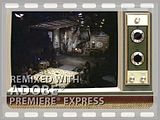
The prematurely white hair. The sometimes wild and crazy, sometimes mild and smart humor. A staying power matched by few of his or any generation. Steve Martin has done it all, done it well, and done it for a long time now. He's a comedy icon, but he's also proven he can do dramatic work on camera. Behind the scenes he's a writer. I mean writer having typed out jokes, screenplays, stage plays, essays and novels. His style is sometimes absurdist and silly, sometimes serious and witty, and often within the very same scene or paragraph. He has starred in hugely popular blockbusters, sold millions and millions of albums, written betsellers, hosted everything from "The Tonight Show" to the Academy Awards, won Emmys, Grammys (just about everything but an Oscar), and generally proven himself in every medium there is. Oh, and he plays a mean banjo. And damnit...he seems like a nice guy, too.

Steve Martin started small...real small. As a young boy and then teenager he worked in the magic shop in the castle at Disneyland, which opened not far from his Orange County home in 1955. From there he moved down the road to Knott's Berry Farm where he performed on stage as part of a musical and comedy revue. He enrolled in Long Beach State College with a major in philosophy, considering a career in teaching. But the performing bug was still inside him, and though the philosophy classes informed his sensibility, he decided to try and make it as a comic. This was the late 1960, long before there were such things as regular comedy clubs. So you wound up playing coffeehouses and small clubs, college campuses, and opening for Rock or Folk music acts. Steve was experimenting in blending his magic tricks, Vaudeville style theatrics, and serious philosophy into a coherent and original act. For many, many years it didn't have the right balance and didn't click for the audience or the man performing it. He lucked into a writing gig on the popular "Smothers Brothers Comedy Hour" on CBS and was often paired in assignments with another young up and comer, Rob Reiner, son of the great comedian Carl Reiner. Steve appeared on camera from time to time, though he was mainly behind the scenes, getting a masters education in comedy. Tommy Smothers was in constant battles with the network and censors over the political content of the show, and even though it had great ratings it was abruptly canceled. That fall after cancellation, the show won the Emmy for best writing, including Steve Martin for his contributions.
The television show was a great learning experience, but Steve knew he wanted to make it on his own, doing his own thing. Through lots of hard work and lots of time on the road, the stand-up act finally began to work. It was full of non sequiturs and what would later be labeled ironic "anti-comedy". Whatever you want to call it, it was something new. The gigs started getting better, and he was getting more and more exposure as a guest on talk shows. Then came a happy coincidence in that his fanbase started increasing at the same time a new show called "Saturday Night Live" hit the airwaves. Steve's style and persona were a perfect fit, and he guest hosted so often and so memorably in the first few years of the show that he is often mistaken for an original cast member.

His novelty record launched on the air, "King Tut", about the mania surrounding the museum tour of Tutankhamun's artifacts, was a smash best seller, as were his live stand-up albums. By the late 1970s, Steve was a bonafide superstar, his act so popular that he was filling arenas and stadiums instead of clubs. The size and impact of his stand-up during this period has really been unequaled, before or since. Martin was a cultural phenomenon, with catch phrases on T-Shirts, and a seeming ubiquity in the day's pop culture.

The movies were the next logical step. In 1977 at the height of his "SNL" and stand-up popularity he made a comedy short, "The Absent-Minded Waiter". Directed by another "Smothers Brothers" alumnus, Carl Gottlieb, who had adapted the screenplay for Spielberg's Jaws, and starring Buck Henry & Teri Garr playing off some of Steve's antics partially developed in his act, it was nominated for the Oscar for Best Live Action Short Subject. His first two roles in big feature films were in support. He played Doctor Maxwell Edison in the embarrassing flop Sgt. Pepper's Lonely Hearts Club Band (1978) starring The Bee Gees and Peter Frampton in a plot loosely assembled from Beatles songs. No matter. His second film was another comedy cameo, playing a waiter to Miss Piggy and Kermit the Frog in the all-star The Muppet Movie (1979).

For his first starring role, Steve assembled Carl Gottleib and friend Michael Elias to help him truly turn a bunch of his stand-up material into something they could expand upon for a feature length movie. Directed by Carl Reiner, the resulting movie was The Jerk (1979). Aided by his already massive popularity, it was a smash at the box office, and Steve was an immediate movie star. Full of classic gags, The Jerk is simultaneously crass and smart, and its success plus the grueling grind of the road made Martin retire from stand-up and focus on the cinema. He also figured there was no way to best the kind of phenomenon his stage act had become, so why not go out on top?

In his first two projects after The Jerk he tried to prove he could do more than just the wild and crazy stuff he had become uber-famous for. Pennies from Heaven (1981) is one of my favorite movies, a dark fantasy that is the Musical as psychotic episode, a Depression era tale of love and death with splashy numbers. I think Steve is brilliant in the complicated lead, but it was probably too much of a turn too soon. I love it, but you can kind of see why it would have been tough to market, at that stage in Martin's career. The Jerk it ain't. Read many, many more of my thoughts on Pennies from Heaven HERE.

His third movie was a re-teaming with director Carl Reiner, Dead Men Don't Wear Plaid (1982), and it is another favorite of mine. It ingeniously blends footage of Steve into about twenty old Noirs and Melodramas from the classic period of Hollywood and has him seamlessly interact with screen legends like Bogart, Cagney, Bette Davis, and Cary Grant in scenes from movies including White Heat, Notorious, Double Indemnity, and This Gun for Hire. Not only is it exceedingly clever in its execution, but as a spoof of private eye flicks I think it's a real winner. However, again, it was a commercial failure.

Steve and Carl Reiner's third collaboration was The Man with Two Brains (1983), and this one was zanier, more akin to The Jerk, and has plenty of big, broad laughs. His next project tried to go a little more serious with the comedy in a script by Neil Simon, but The Lonely Guy (1984) was a forgettable dud. His fourth movie with Carl Reiner was their biggest success and much closer to the mix of silly and poignant that Steve was aiming for. All of Me (1984) has Lilly Tomlin's rich b!tch heiress accidentally transmigrated into Steve's body, leading to some absolutely hysterical physical comedy as he only has control over one half of his body. It was a hit with both audiences and critics. He also got a wife out of the deal when he married his co-star, British actress Victoria Tennant. He followed that with another outrageous comedy, ¡Three Amigos! (1986) with Chevy Chase and Martin Short, directed by John Landis. It has grown a deserved cult following, but it wasn't a big hit, and the critics pretty roundly hated it (for some reason). He also had fun hamming it up as the villain in Frank Oz's Musical re-make of Little Shop of Horrors (1986) where he plays a sadistic dentist who treats Seymour's would-be girl badly and needs to be fed to the mean green muther from outer space!

His next movie was his first, true cinematic home run. Steve had been co-writing many of the screenplays, from The Jerk onward, but for Roxanne he went solo and expressed his sole cinematic vision for the first time. A very funny Romantic Comedy that cleverly updates and modernizes Cyrano de Bergerac and places it in a Colorado mountain resort town where the man with the impossibly huge schnoz, Charlie C.D. Bailes, is a fire chief rather than a swordsman. It is sincerely sweet, it is hysterically funny, it is smart, and it is silly...and it all works! Roxanne was a hit at the box office and the critics loved it. It probably remains Steve's best script, and it was perfectly realized.
CONTINUED...
.
__________________
"Film is a disease. When it infects your bloodstream it takes over as the number one hormone. It bosses the enzymes, directs the pineal gland, plays Iago to your psyche. As with heroin, the antidote to Film is more Film." - Frank Capra
"Film is a disease. When it infects your bloodstream it takes over as the number one hormone. It bosses the enzymes, directs the pineal gland, plays Iago to your psyche. As with heroin, the antidote to Film is more Film." - Frank Capra
Last edited by Holden Pike; 07-14-22 at 11:52 AM.










 )
)






